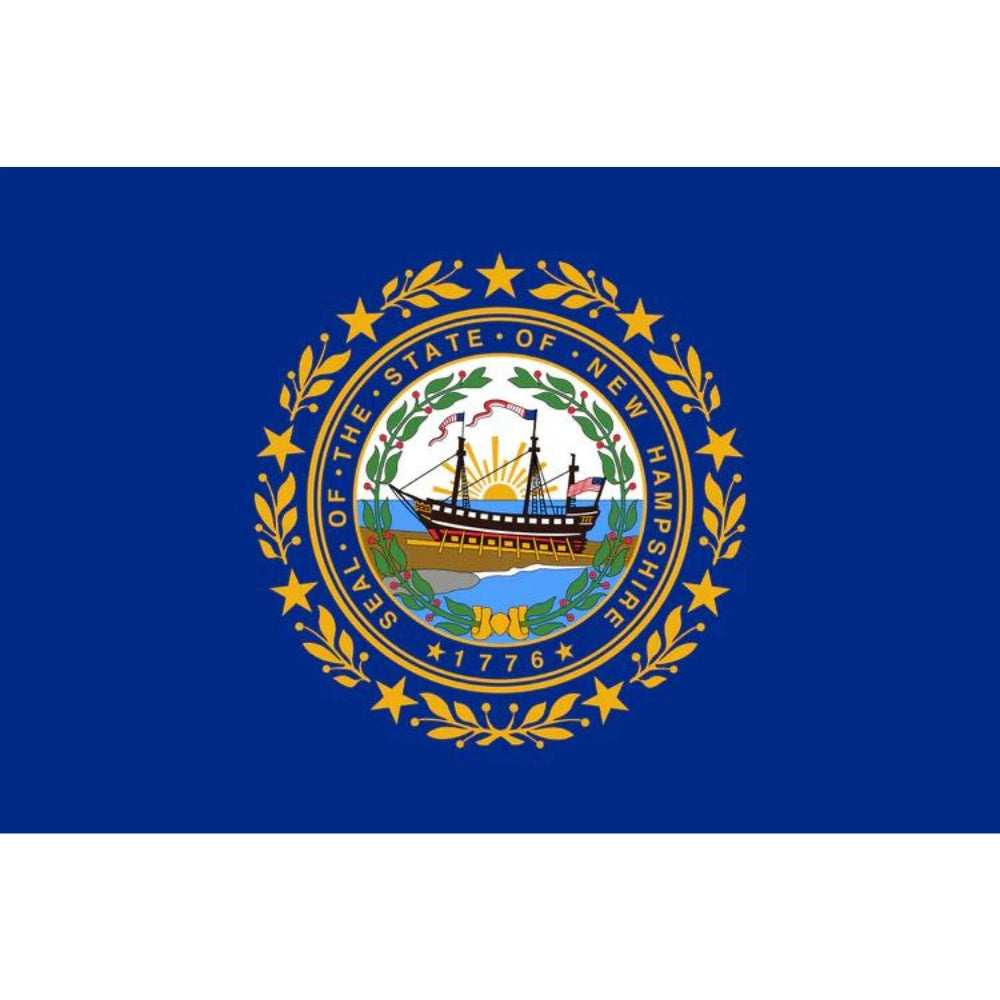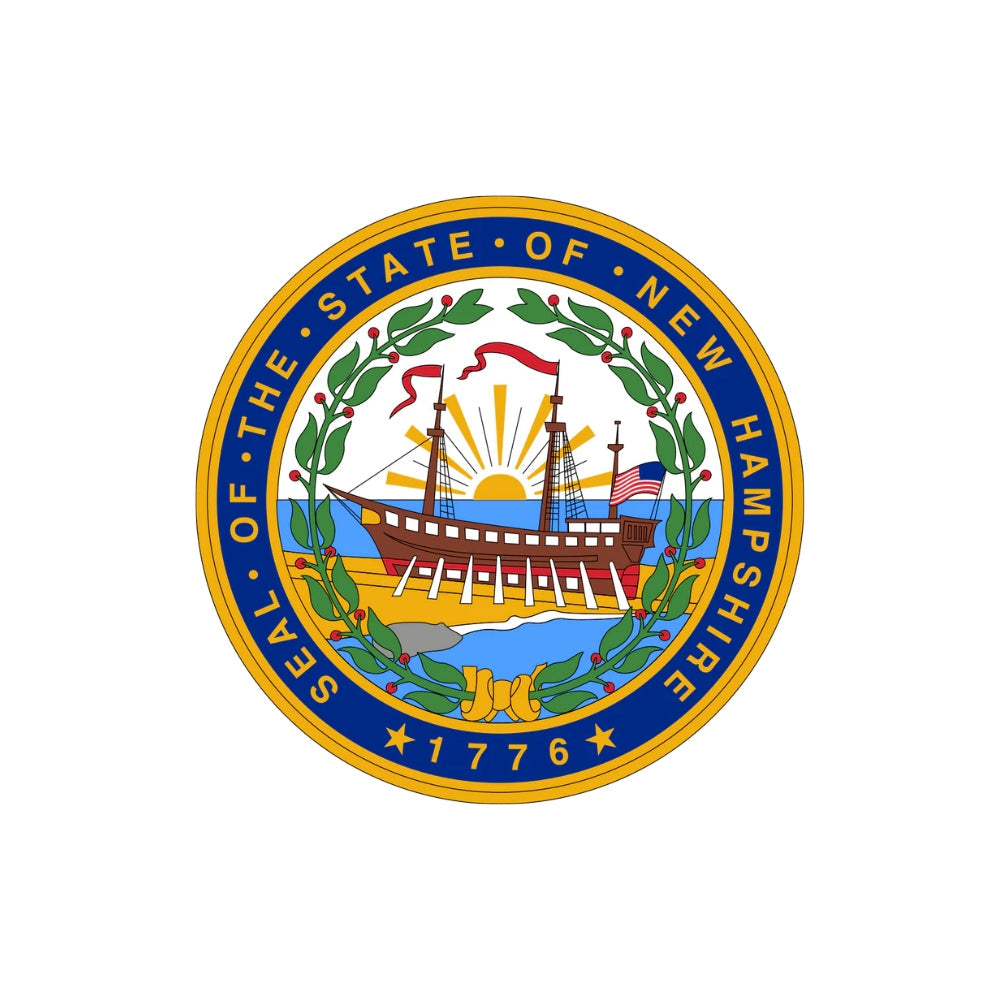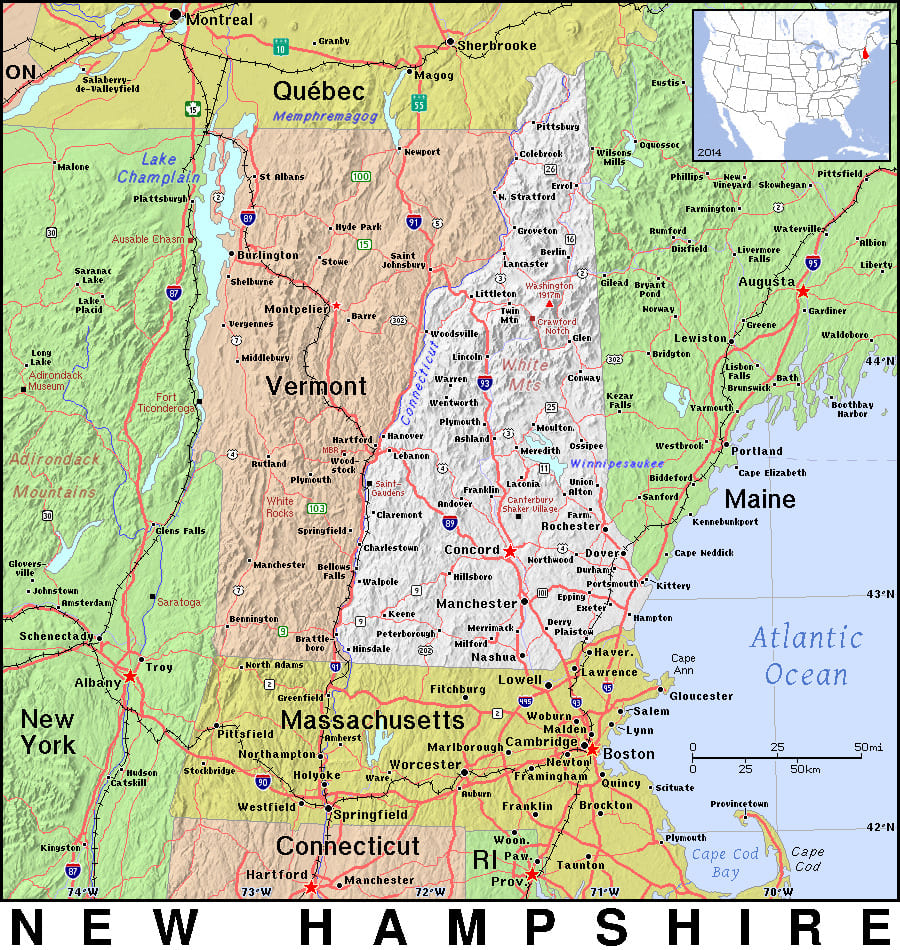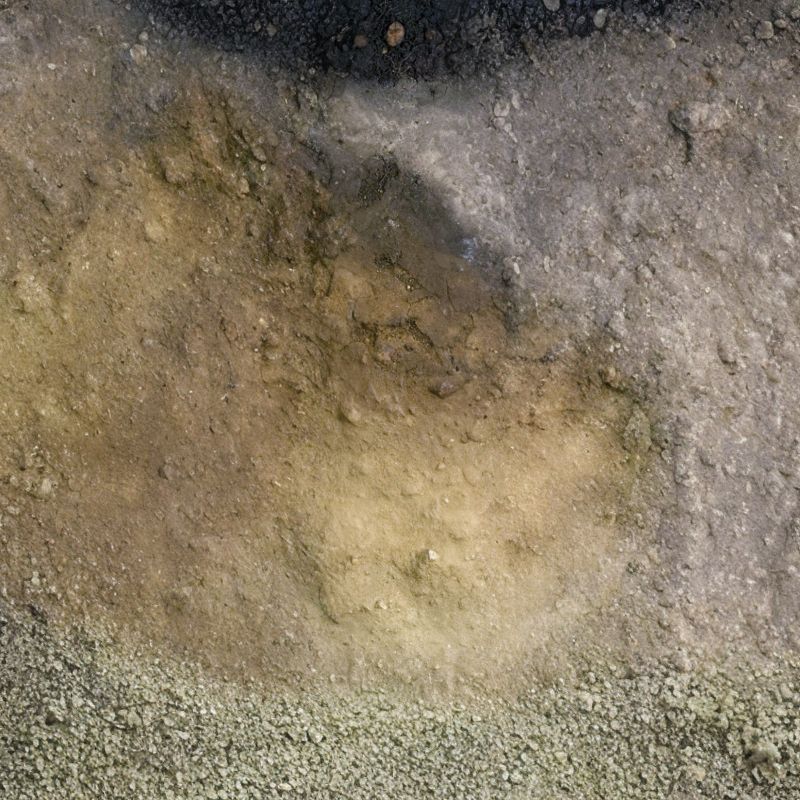Explore the Fascinating History of New Hampshire
Take our New Hampshire Trivia Quizzes for a Chance to Win a 6-Month Subscription to History By Mail!

The History of New Hampshire
Journey Through New Hampshire Trivia
Welcome to our New Hampshire history and trivia page, presented by History By Mail. Join us as we embark on a journey through the captivating past and cultural tapestry of the Granite State. From the indigenous peoples who first inhabited the region, such as the Abenaki, Pennacook, and Piscataqua tribes, to the arrival of European settlers and the modern era, we'll delve into New Hampshire's hidden gems and challenge your knowledge with entertaining quizzes. Let's uncover the rich history and intriguing trivia of New Hampshire together.
New Hampshire, known as the Granite State, is a land of extraordinary history and natural beauty. From the early colonial settlements and the birth of American independence to its breathtaking landscapes, New Hampshire holds a captivating legacy. From the charming coastal towns of Portsmouth and Hampton Beach to the majestic White Mountains and picturesque lakes, the state showcases a blend of historical landmarks, outdoor adventures, and a deep connection to its colonial roots.
Join us as we unravel the intriguing history and trivia of New Hampshire, delving into its role in the American Revolution, its contributions to the textile and manufacturing industries, and the fascinating stories that make it a unique and cherished part of our nation's heritage.
Facts about New Hampshire
State Abbreviation: NH
Capital: Concord
Name Origin: Englishman John Mason named New Hampshire after Hampshire county in England where he’d lived as a boy. He invested in building on the land, but never left England to see it.
Nickname: Granite State
Statehood: June 21, 1788 (9th State)
State Motto: “Live free or die”

New Hampshire's Flag
The State Flag of New Hampshire features a blue field with the state seal placed in the center. The seal depicts a golden ship sailing on a blue ocean, representing the state's maritime history and connection to trade and commerce. Above the seal is a golden banner with the state motto, "Live Free or Die," inscribed in bold letters. The flag's design is simple yet powerful, symbolizing the state's independent spirit and commitment to freedom.
The New Hampshire state flag holds significant historical and cultural meaning. The blue color represents loyalty, while the gold elements represent valor and prosperity. The ship on the seal symbolizes the state's strong maritime tradition and its role in shaping New Hampshire's economy and identity.
The state motto, "Live Free or Die," reflects New Hampshire's deep-rooted belief in personal liberty and self-determination. It serves as a reminder of the state's historical contributions to the fight for independence and the preservation of individual freedoms.
New Hampshire's Great Seal
The Great Seal of New Hampshire holds immense significance as it embodies the state's essence, history, and principles. With a circular design rich in detail and symbolism, it features the USS Raleigh sailing serenely at its center—a tribute to maritime heritage and exploration. A rising sun above signifies new beginnings and prospects. Encircling the core are key elements: "SEAL OF THE STATE OF NEW HAMPSHIRE" in the outer ring denotes officiality; within, a laurel wreath symbolizes triumph, nine stars mark its Constitutional ratification, and "LIVE FREE OR DIE" atop embodies resolute commitment to liberty, rooted in its Revolutionary past.

--- State Trivia #1 ---
History of New Hampshire
The territory of present-day New Hampshire was once inhabited by the Androscoggin and Pennacook nations of the Abenaki people. However, with the arrival of English settlers, the Native American populations were largely displaced. In 1623, under an English land grant, Captain John Smith sent settlers to establish a fishing colony at the mouth of the Piscataqua River, near present-day Rye and Dover. It was Captain John Mason, a participant in the founding of Portsmouth in 1630, who gave New Hampshire its name, inspired by Hampshire in England.
After a period of 38 years in union with Massachusetts, New Hampshire became a separate royal colony in 1679. The state played a significant role in the American Revolution, with its delegates being the first to vote for the Declaration of Independence on July 4, 1776. In 1905, New Hampshire gained international attention when the Portsmouth Naval Base hosted the signing of the Treaty of Portsmouth, which ended the Russo-Japanese War.
Abundant water power fueled New Hampshire's early industrial development, and manufacturing remains a major source of income for the state. The principal industrial products include electrical and other machinery, textiles, pulp and paper products, and stone and clay products. Agriculture in New Hampshire is characterized by dairy and poultry farming, as well as the cultivation of fruits, truck vegetables, corn, potatoes, and hay.
New Hampshire boasts several attractions for vacationers, such as Lake Winnipesaukee, the largest among the state's 1,300 lakes and ponds. The White Mountain National Forest, covering 724,000 acres, offers stunning natural beauty. Visitors can explore Daniel Webster's birthplace near Franklin and experience the restored buildings of the original settlement at Strawbery Banke in Portsmouth. Unfortunately, in 2003, the iconic "Old Man of the Mountain," a granite head profile and the state's official emblem, fell from its perch in Franconia, marking the end of an era.
State Symbols
Fun Facts
- Maple sundaes and cider donuts are popular desserts in New Hampshire.
- New Hampshire’s famous names include President Franklin Pierce, journalist Horace Greeley, and author Dan Brown.
- Strawbery Banke in Portsmouth—the site of the state’s original settlement—has 32 historic buildings where people can watch costumed performers act out life from colonial times.
- Mount Washington held the record for over half a century for highest surface wind speed (231 mph, 371 kph), comparable to winds in Category 5 hurricanes and F4 tornadoes.
--- State Trivia #2 ---

Things To Do in New Hampshire
- Explore the White Mountains: New Hampshire's White Mountains offer breathtaking scenery and outdoor adventures. Hike along scenic trails such as the Franconia Ridge Loop or Mount Washington, the highest peak in the northeastern United States. During the winter months, enjoy skiing and snowboarding at popular resorts like Loon Mountain and Bretton Woods.
- Visit Portsmouth: Discover the charming coastal city of Portsmouth, known for its historic charm and vibrant cultural scene. Stroll through the historic Strawbery Banke Museum, which showcases restored homes and exhibits from different periods in American history. Explore the bustling Market Square, lined with shops, restaurants, and art galleries. Don't miss a visit to the USS Albacore Museum, featuring a retired U.S. Navy submarine.
- Enjoy Lake Winnipesaukee: Spend a day on the beautiful Lake Winnipesaukee, one of New Hampshire's largest lakes. Rent a boat and go fishing, swimming, or simply relax on the lake's pristine shores. Take a scenic cruise to enjoy the surrounding natural beauty and admire the lake's islands. In the winter, the lake offers ice fishing, snowmobiling, and even ice skating.
- Discover the Franconia Notch State Park: Located in the heart of the White Mountains, Franconia Notch State Park is a must-visit destination for nature enthusiasts. Hike the popular Flume Gorge trail, where you can walk through a narrow chasm with towering granite walls and a cascading waterfall. Take a scenic drive along the Franconia Notch Parkway to admire stunning mountain vistas and stop at attractions like the Cannon Mountain Aerial Tramway or the Basin, a unique pothole formation.
- Explore the Squam Lakes Region: The Squam Lakes Region offers a tranquil retreat with its pristine lakes and picturesque landscapes. Take a boat tour or rent a kayak to explore Squam Lake, which served as the filming location for the movie "On Golden Pond." Embark on hiking trails that provide panoramic views of the surrounding forests and mountains. Visit the Squam Lakes Natural Science Center to learn about the area's wildlife and ecology through interactive exhibits and live animal presentations.

General Map of New Hampshire
New Hampshire, known as the "Granite State," is a captivating destination located in the northeastern region of the United States. Renowned for its natural beauty, charming towns, and outdoor adventures, New Hampshire offers a wealth of experiences for visitors to explore and enjoy.
Famous People From New Hampshire
--- State Trivia #3 ---
FREQUENTLY ASKED QUESTIONS (FAQ) ABOUT NEW HAMPSHIRE
New Hampshire was named by Captain John Mason, an English landowner and colonizer, in honor of Hampshire County in southern England. Mason was granted the territory by the Council for New England in the early 17th century. The name "New Hampshire" first appeared in a land grant issued in 1629.
New Hampshire played a crucial role in the American Revolution. It was the first colony to declare its independence from British rule on January 5, 1776, six months before the signing of the Declaration of Independence. The state's militia participated in several significant battles, including the Battle of Bunker Hill and the Battle of Bennington. Additionally, New Hampshire was home to leaders like John Stark and John Langdon, who made notable contributions to the revolutionary cause.
New Hampshire's motto, "Live Free or Die," reflects the state's strong commitment to personal liberty and independence. It was adopted in 1945 and embodies the spirit of the American Revolutionary War. This motto is a bold reminder of the state's values and has even made its way onto the state license plates.
New Hampshire's first constitution, adopted in 1776, was one of the earliest in the newly formed United States. It established a government based on democratic principles and served as a model for other states' constitutions and even the U.S. Constitution. It emphasized the separation of powers, individual rights, and the people's right to alter or abolish government if it became oppressive.
Related Resources
- Official Website of the State of New Hampshire: The official website provides information about government services, business resources, tourism, and more. Visit: https://www.nh.gov/
- New Hampshire Division of Travel and Tourism Development: Explore attractions, events, outdoor activities, and plan your visit to New Hampshire. Visit: https://www.visitnh.gov/
- New Hampshire Historical Society: Learn about New Hampshire's history, access archival resources, and explore educational programs. Visit: https://www.nhhistory.org/
- New Hampshire State Parks: Discover the state parks of New Hampshire, including information on camping, hiking trails, and recreational activities. Visit: https://www.nhstateparks.org/
- New Hampshire Fish and Game Department: Find information on fishing, hunting, wildlife, and conservation efforts in New Hampshire. Visit: https://www.wildlife.state.nh.us/
- New Hampshire Department of Natural and Cultural Resources: Explore the state's cultural heritage, museums, historic sites, and arts programs. Visit: https://www.nh.gov/nhculture/
- New Hampshire Division of Economic Development: Access resources for businesses, economic development programs, and information on relocating to New Hampshire. Visit: https://business.nh.gov/
- New Hampshire State Library: Access the state's library resources, online databases, and digital collections. Visit: https://www.nh.gov/nhsl/
- New Hampshire State Archives: Discover historical records, genealogy resources, and research guides at the state archives. Visit: https://www.sos.nh.gov/archives/
- New Hampshire Department of Education: Find information on schools, education programs, and resources for students, parents, and educators. Visit: https://www.education.nh.gov/





